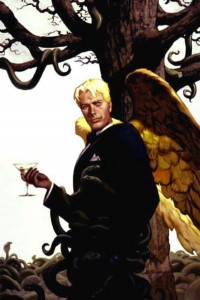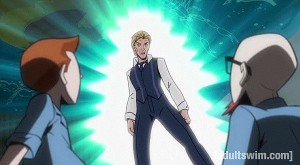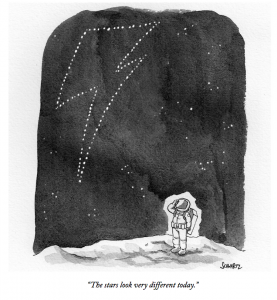One of the greats is gone: David Bowie died on January 10, 2016. He left behind a legacy of brilliant music, groundbreaking films, and enormous contributions to the fields of science fiction and fantasy.
From his breakout hit “A Space Oddity” to his iconic concept album and persona Ziggy Stardust, and on to his Orwell-inspired masterpiece “Diamond Dogs” and beyond, his musical career, spanning nearly 50 years, defined science fiction rock and roll.
His acting performances – in “Labyrinth”, “The Man Who Fell to Earth”, “The Hunger”, “The Image”, and “Twin Peaks: Fire Walk With Me” (to name but a few) – mirrored the ethereal nature of his cosmic rock.
And the field of science fiction and fantasy returned the favor: as Smithsonian Magazine explains, Bowie inspired a number of characters in the genre we love so well.
In the Sandman comic book series, writer Neil Gaiman specifically based the character of Lucifer on the singer, while Batman scribe Grant Morrison later admitted to basing his version of the Joker on Bowie’s ’80s persona… Recently, the television series The Venture Brothers cast the leader of a massive super organization of super villains as a shapeshifter so inspired by Bowie that he took on the singer’s appearance.
Bowie as Lucifer in Sandman
Bowie on Venture Brothers
All of these elements led to his induction into the Science Fiction and Fantasy Hall of Fame, and his inclusion in the web-based Science Fiction Encyclopedia.
Here are some articles providing a brief look at his life, his work, and his contributions to science fiction and fantasy. Farewell, Starman – and thank you for making our lives a little weirder and a lot more interesting.
From Rolling Stone, February 28, 1974: William S. Burroughs Interviews David Bowie
Beat Godfather Meets Glitter Mainman
Burroughs: Could you explain this Ziggy Stardust image of yours? From what I can see it has to do with the world being on the eve of destruction within five years.
Bowie: The time is five years to go before the end of the earth. It has been announced that the world will end because of lack of natural resources. [The album was released three years ago.] Ziggy is in a position where all the kids have access to things that they thought they wanted. The older people have lost all touch with reality and the kids are left on their own to plunder anything. Ziggy was in a rock & roll band and the kids no longer want rock & roll. There’s no electricity to play it. Ziggy’s adviser tells him to collect news and sing it, ’cause there is no news. So Ziggy does this and there is terrible news. “All the Young Dudes” is a song about this news. It is no hymn to the youth as people thought. It is completely the opposite.
Burroughs: Where did this Ziggy idea come from, and this five-year idea? Of course, exhaustion of natural resources will not develop the end of the world. It will result in the collapse of civilization. And it will cut down the population by about three-quarters.
Bowie: Exactly. This does not cause the end of the world for Ziggy. The end comes when the infinites arrive. They really are a black hole, but I’ve made them people because it would be very hard to explain a black hole onstage.
Burroughs: Yes, a black hole onstage would be an incredible expense. And it would be a continuing performance, first eating up Shaftesbury Avenue.
Bowie: Ziggy is advised in a dream by the infinites to write the coming of a starman, so he writes “Starman,” which is the first news of hope that the people have heard. So they latch onto it immediately. The starmen that he is talking about are called the infinites, and they are black-hole jumpers. Ziggy has been talking about this amazing spaceman who will be coming down to save the earth. They arrive somewhere in Greenwich Village. They don’t have a care in the world and are of no possible use to us. They just happened to stumble into our universe by black-hole jumping. Their whole life is traveling from universe to universe. In the stage show, one of them resembles Brando, another one is a black New Yorker. I even have one called Queenie the Infinite Fox.
Now Ziggy starts to believe in all this himself and thinks himself a prophet of the future starman. He takes himself up to incredible spiritual heights and is kept alive by his disciples. When the infinites arrive, they take bits of Ziggy to make themselves real because in their original state they are anti-matter and cannot exist on our world. And they tear him to pieces onstage during the song “Rock and Roll Suicide.” As soon as Ziggy dies onstage the infinites take his elements and make themselves visible. It is a science-fiction fantasy of today and this is what literally blew my head off when I read Nova Express, which was written in 1961. Maybe we are the Rogers and Hammerstein of the Seventies, Bill!
David Bowie Is Science Fiction and Fantasy Personified – Tor.com article published last year
In Memory of a Science Fiction Entertainment Giant – Extreme Tech article
David Bowie fused science fiction and pop culture: How “The Man who Fell to Earth” impacted our lives. – Engadget tribute
Science Fiction and Fantasy Owes a Huge Debt to David Bowie – Techtimes article
David Bowie Made The World a Safer Place for the Alien in Us All – Gizmodo tribute
RIP David Bowie: Exploring the Starman’s Legacy in Genre and Science Fiction – From Blastr.com
Rest In Peace, David Bowie: The Man Who Changed Science Fiction – From the sci-fi.mandiner blog
Why David Bowie Was a Geek Icon – Vulture.com’s tribute
David Bowie’s 100 Favorite Books – From Electric Literature, based on a Facebook post from Bowie himself in 2013; science fiction entries include A Clockwork Orange, The Wasteland, and 1984
David Bowie: A Starman Not Just in Music, But in the Movies Too – Time Magazine
“Bowie Was Like Orson Welles”: Diamond Dogs At 40 – Mojo4music piece written 2 years ago, about Bowie’s 1984-inspired masterpiece
The Hideous Ecstasy Of Fear: Diamond Dogs 40 Years On: It starts with an otherworldly squall, and the decadent dystopia of Diamond Dogs is never over, as Matthew Lindsay explains – Brilliant article from The Quietus about the album Orwell inspired




A very nice tribute to such a legendary performer. David would approve.
Added in tribute – The 12 Regenerations of David Bowie
https://twitter.com/MitchBenn/status/685479912917102597
DavidBowieRIP #homage #art
This was an excellent piece to honor David Bowie. His revolutionary style was to remember. His addiction to “Poppers, Milk and Cocaine in the 1970’s led him to placing his urine in his refrigerator for security reasons. He believed that there were persons unknown who wanted to steal his urine…
Personally I discourage those three items used in conjunction with each other based on the obvious paranoid theme which comes to mind.
He did a Geographic to Berlin circa 1976 to clean up…